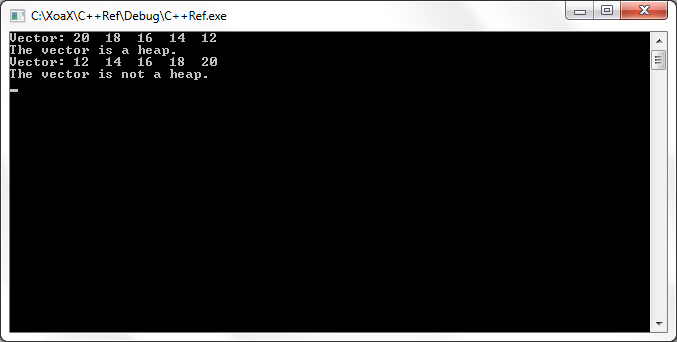algorithm - STL C++
is_heap()
Declaration
template <class RandomAccessIterator> bool is_heap( RandomAccessIterator xFirst, RandomAccessIterator xLast );
Description
This function returns true is the range of entries starting at "xFirst" up to the one before "xLast" is a heap. In the overloaded version, the comparison function "xComp" is used to define the ordering.Header Include
#include <algorithm>
Overloads
template <class RandomAccessIterator, class BinaryPred> bool is_heap( RandomAccessIterator xFirst, RandomAccessIterator xLast, BinaryPred xComp );
Example
#include <iostream>
#include <vector>
#include <algorithm>
int main()
{
using namespace std;
// Create a vector instance
vector<int> qV;
for (int i = 0; i < 10; i += 2) {
qV.push_back(20 -i);
}
vector<int>::iterator qIter;
cout << "Vector: ";
for (qIter = qV.begin(); qIter != qV.end(); ++qIter) {
cout << *qIter << " ";
}
cout << endl;
// Check whether the vector is a heap
bool bIsHeap = is_heap(qV.begin(), qV.end());
cout << "The vector " << (bIsHeap ? "is" : "is not") << " a heap." << endl;
// Reverse the vector
reverse(qV.begin(), qV.end());
cout << "Vector: ";
for (qIter = qV.begin(); qIter != qV.end(); ++qIter) {
cout << *qIter << " ";
}
cout << endl;
// Check whether the vector is a heap
bIsHeap = is_heap(qV.begin(), qV.end());
cout << "The vector " << (bIsHeap ? "is" : "is not") << " a heap." << endl;
// Keep the window open
cin.get();
return 0;
}Output

© 2007–2024 XoaX.net LLC. All rights reserved.
